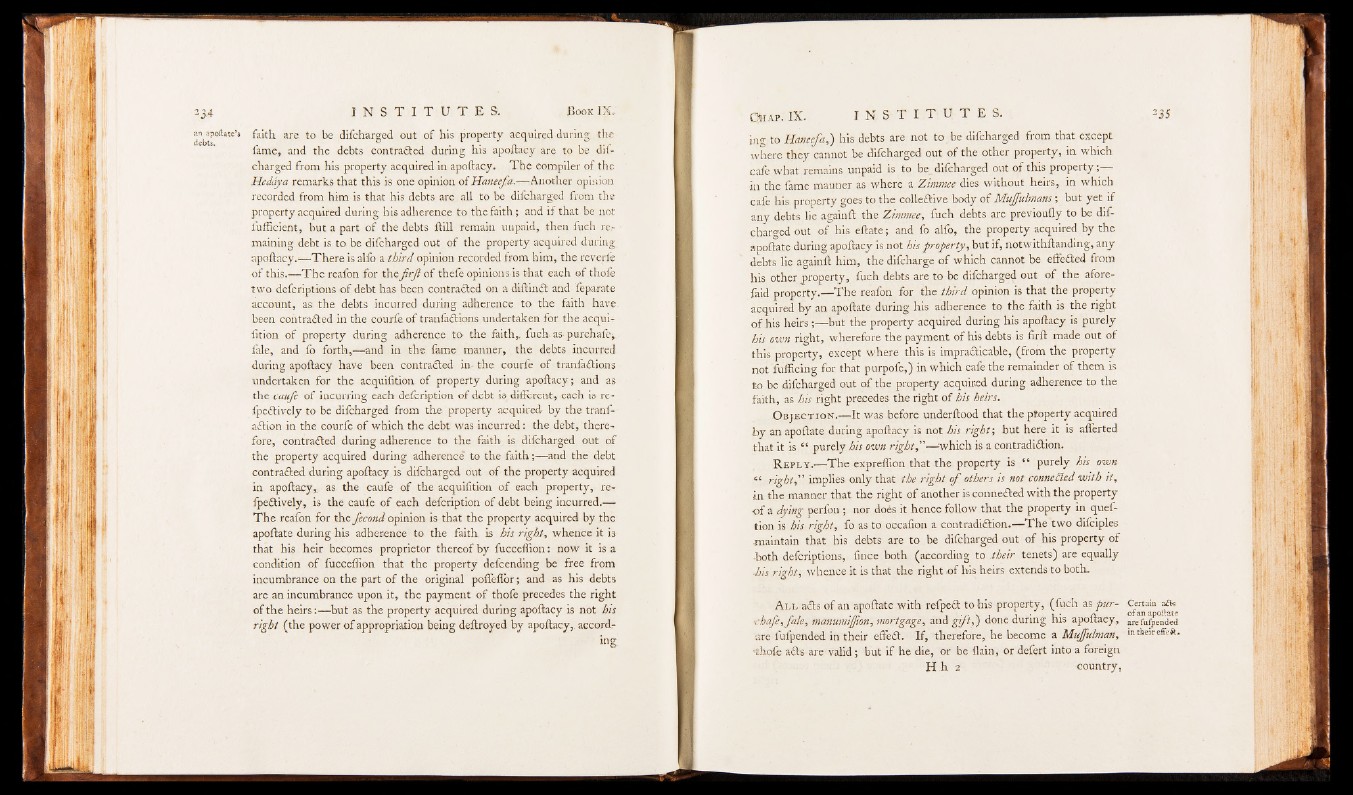
an apoftate’s
debts.
faith are to be difcharged out of his property acquired during the
fame, and the debts contracted during his apoftacy are to be discharged
from his property acquired in apoftacy. The compiler of the
Hedâya remarks that this is one opinion of Haneefa.— Another opinion
recorded from him is that his debts are all to be difcharged from the
property acquired during his adherence to the faith ; and if that be not
fufficient, but a part of the debts ftill remain unpaid, then fuch ref
maining debt is to be difcharged out of the property acquired during
apoftacy.— There is alfo a third opinion recorded from him, the reverie
of this.— The reaibn for thefirfi of thefe opinions-is that each of thofe
two defcriptions of debt has been contracted on a diftinCt and feparate
account, as the debts .incurred during adherence to the faith have,
been contracted in the courfe. of tranfaCtions undertaken for. the acqui*
fition of property during adherence to the faith,, fuch.as, purchafe;
fale, and fo forth,— and in the fame manner, the debts incurred
during apoftacy have been contradted in- the courfe of tranfadlions
undertaken for the acquifition of property during apoftacy; and as
the caufe of incurring each defcription of debt is- different,, each is re-
fpeCtively to be difcharged from the property acquired by the tranf-
adtion in the courfe of which the debt was incurred: the debt,'therefore,
contradted during adherence to the faith is difcharged out of
the property acquired during adherence to the faith ;— and the debt
contradted during apoftacy is difcharged out of the property acquired
in apoftacy* as, the caufe of the acquifition of each property, re-
fpedtively, is the caufe of each defcription of debt being incurred.—
The reaibn for the fécond opinion is that the property acquired by the
apoftate during his adherence to the faith is his. right-, whence it is
that his heir becomes proprietor thereof by fucceifion : now it is a
condition of fucceifion that the property defcending be free from
incumbrance on the part of the original poifeilbr ; and as his debts
are an incumbrance upon it, the payment of thofe precedes the right
of the heirs :— but as the property acquired during apoftacy is not his
right (the power o f appropriation being deftroyed by apoftacy, according:
to Haneefa,) his debts are not to be difcharged from that except
where they cannot be difcharged out of the other property, in which
cafe what remains unpaid is to be_ difcharged out of this property .;—
in the fame manner as where a Zimmee dies without heirs, in which
cafe his property goes to the collective body of Muffulmans-, but yet if
any debts lie againft the Zimmee, fuch debts are previoufly to be dif-
charo-ed out -of his eftate; and fo alfo, the property acquired by the
apoftate during apoftacy is not his property, but if, notwithftanding, any
debts lie againft him, the difcharge of which cannot be effected from
his other property, fuch debts are to be difcharged out of the afore-
faid property.— The reafon for the third opinion is that the property
acquired by an apoftate during his adherence to the faith is the right
of his heirs ;— but the property acquired during his apoftacy is purely
his own right, wherefore the payment of his debts is firft made out of
this property, except where this is impracticable, (from the property
not fufficing for that purpofe,) in which cafe the remainder of them is
to be difcharged out of the property acquired during adherence to the
faith, as his right precedes the right of his heirs.
Objection.— It was before understood that the property acquired
by an apoftate during apoftacy is not his right-, but here it is aflerted
that it is “ purely his own right f — which is a contradiction.
R e p l y .— The expreffion that the property is “ purely his own
“ right," implies only that the right o f others is not conneSkd with it,
in the maimer that the right of another is connected with the property
•of a dying perfon ; nor doés it hence follow that the property in quef-
tion is his right, fo as to occafion a contradiction.— The two difciples
maintain that his debts are to be difcharged out of his property of
Both defcriptions, fince both (according to their tenets) are equally
■ his rights whence it is that the right o f bis heirs extends to both.
A ll adts of an apoftate with refpeCt to his property, (fuch as pur-
\chafe, fale, manumifjion, mortgage, and g ft ,) done during his apoftacy,
are fufpended in their effeCt. If, therefore, he become a Muffulman,
•thofe aCts are valid; but if he die, or be (lain, or defert into a foreign
H h 2 ' country,
Certain a£ts
o f an apoftate
are fufpended
in their effect«